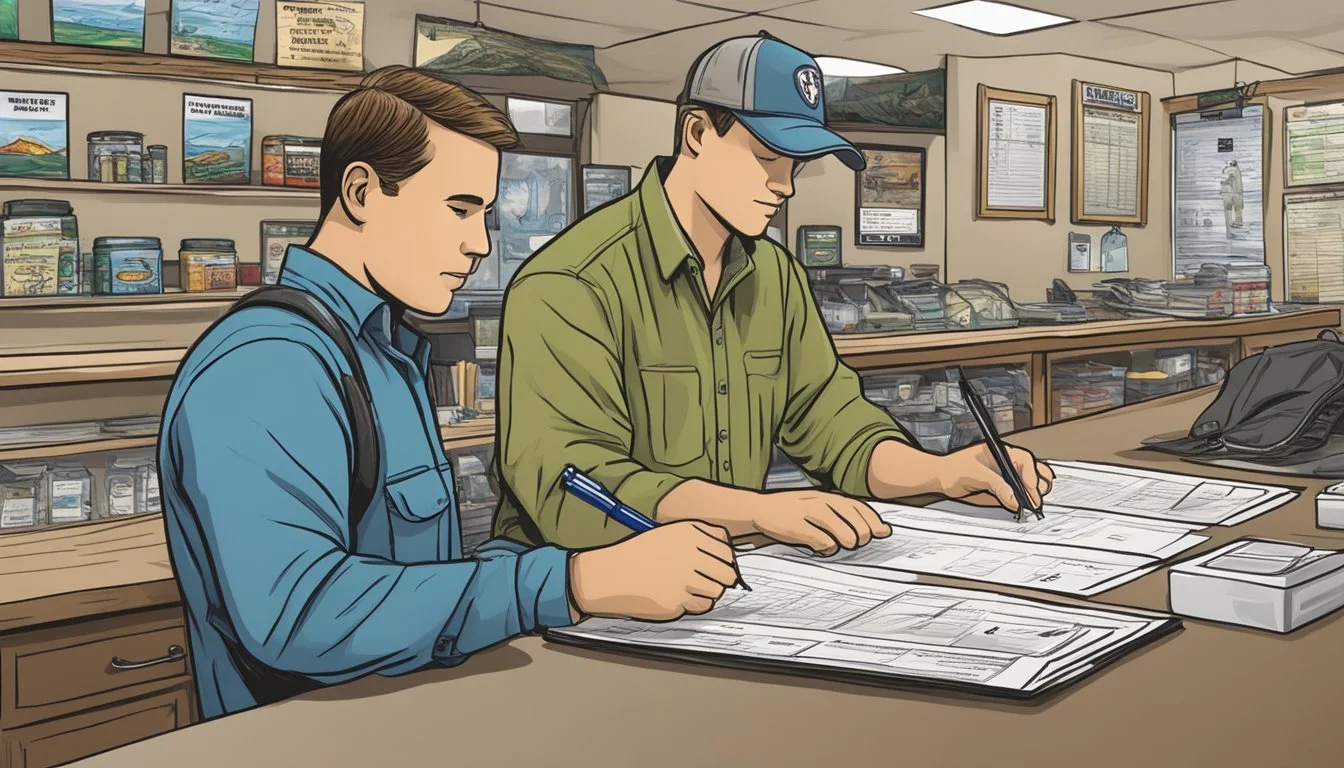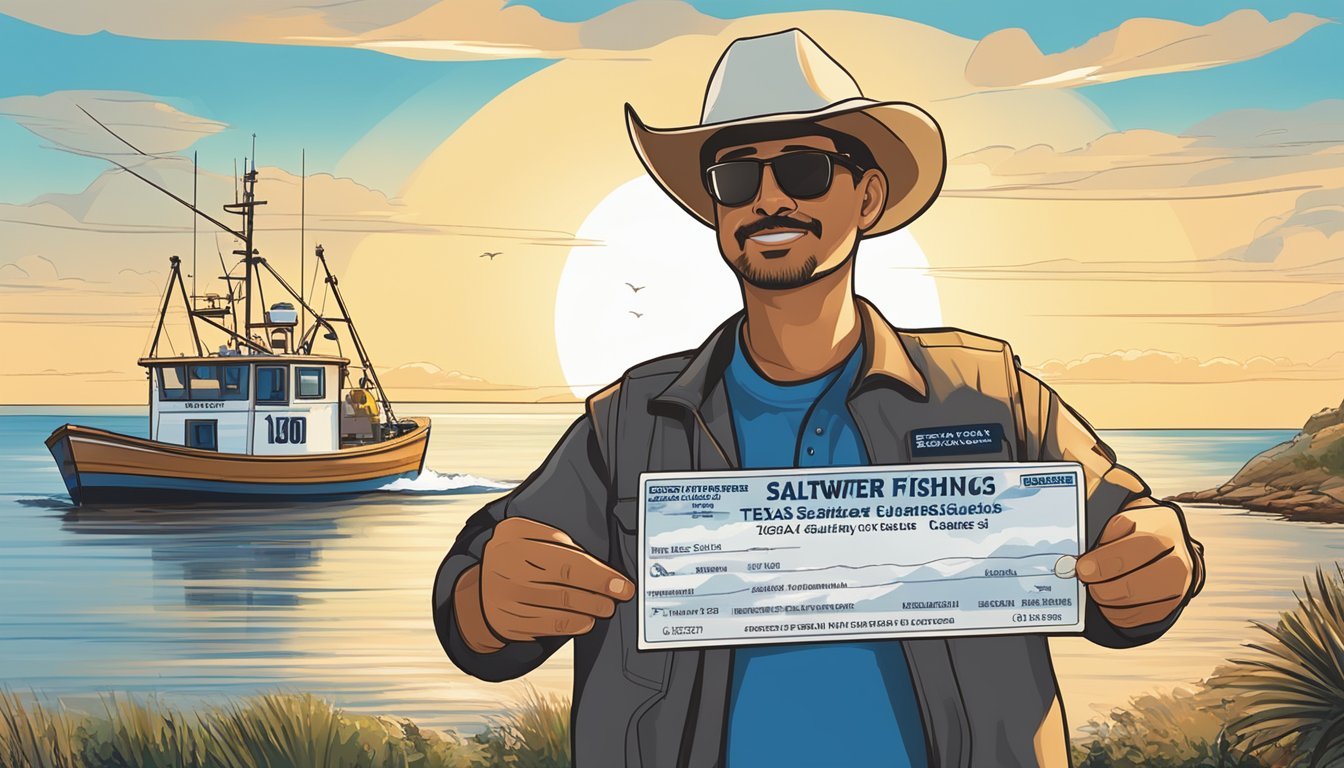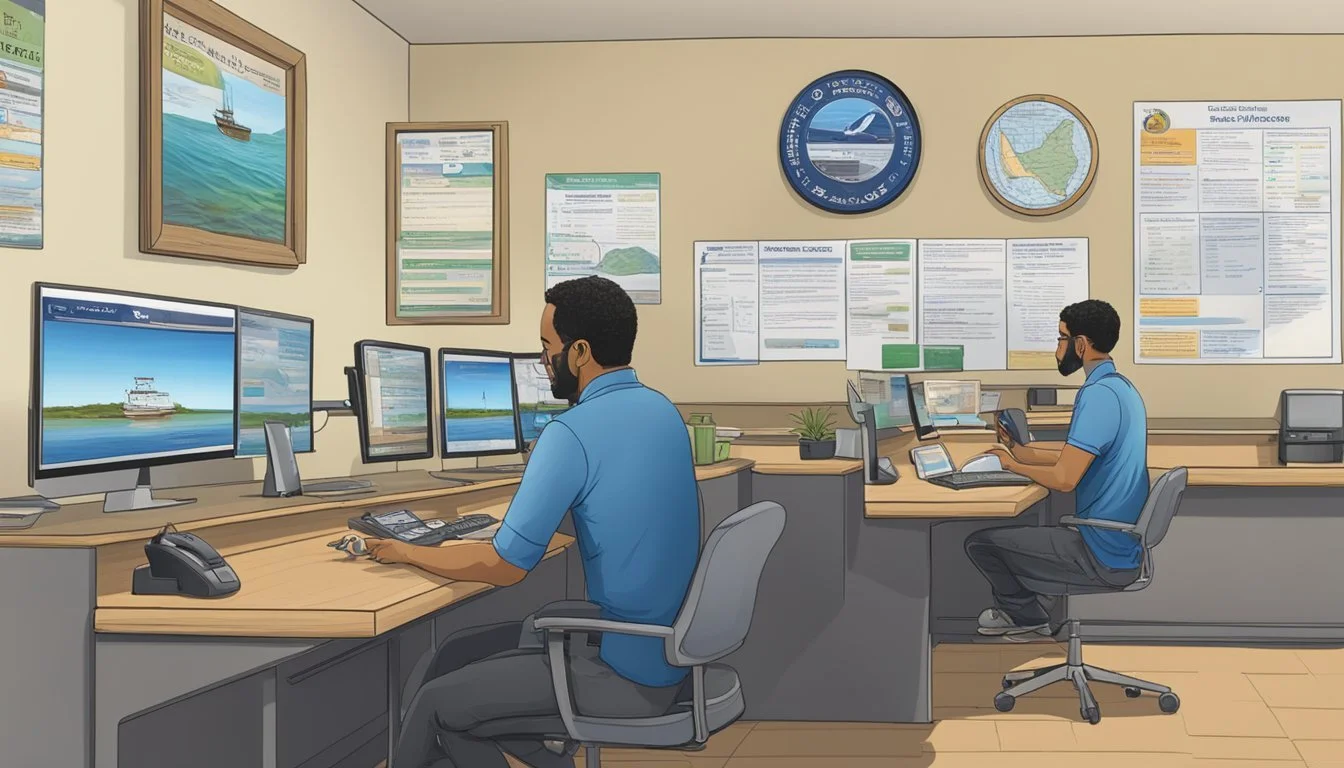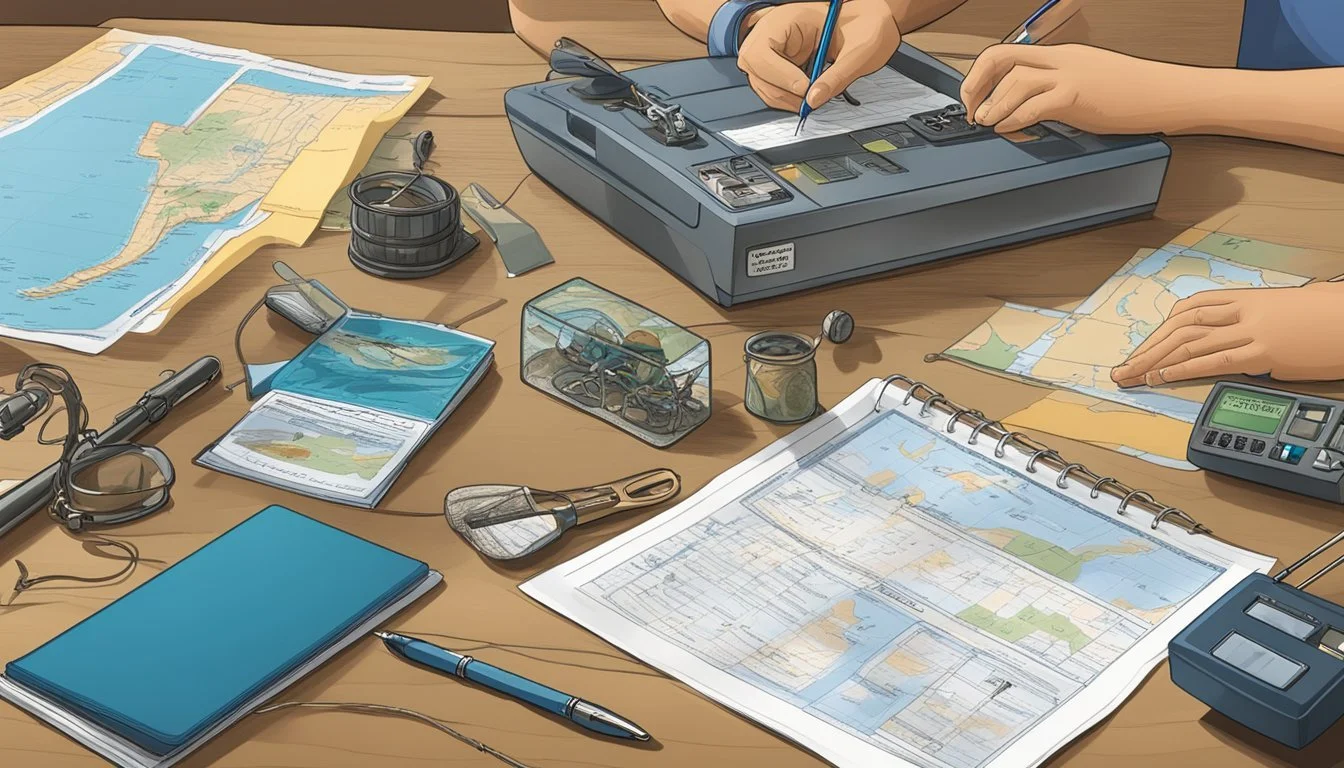How to Get a Texas Saltwater Fishing License
Your Easy Step-by-Step Guide
In Texas, anyone looking to fish (What wine goes well with fish?) in coastal and marine waters needs to acquire a Texas saltwater fishing license. This requirement is in place to help manage and conserve marine environments and fish populations, ensuring that they can be enjoyed by future generations. Such licenses are issued by the Texas Parks & Wildlife Department and come with different endorsements based on the type of fishing activity and the species targeted.
There are several options available for those seeking a saltwater fishing license. Residents and non-residents alike must consider factors such as the duration of the license, whether they'll be fishing for freshwater species as well, and the potential need for additional tags for specific fish species. The process is designed to be accessible, providing anglers with the convenience of purchasing licenses online, over the phone, or in person at various retail locations.
Understanding the requirements for a saltwater fishing license is crucial for compliance with Texas regulations. The state enforces guidelines to protect wildlife and habitats, and part of this stewardship involves acquiring the proper license. Those planning to fish in Texas saltwater areas must ensure they are properly licensed to avoid penalties and to contribute to the conservation efforts within the state.
Eligibility and Requirements
To obtain a Texas saltwater fishing license, applicants must meet specific eligibility criteria and provide necessary documentation. This includes residency status and age-related requirements, both of which play a crucial role in determining the appropriate license and endorsements.
Basic Eligibility and Residency
Texas Resident:
An individual is considered a Texas resident if they have resided in Texas for at least six consecutive months.
Applicants need to provide proof of residency, such as a Texas driver's license or state ID.
Non-Resident:
Non-residents are eligible for different fishing license options tailored to short-term or annual needs.
Age and Special Population Considerations
Youth:
Individuals under the age of 17 do not require a license to fish in Texas.
Seniors:
Texas residents who are 65 years of age or older must purchase a senior resident fishing license.
Disabled Veterans:
Special licensing options are available for disabled veterans.
Proof such as a Veterans Administration disability rating or documentation stating the disability is service-related is required.
Disabled Persons:
Special license options and fee exemptions exist for legally blind or intellectually disabled individuals.
Each category of anglers has distinct requirements and privileges in obtaining a Texas saltwater fishing license, ensuring fair access for all.
Types of Licenses
In Texas, anglers have various licensing options depending on whether they intend to fish in freshwater or saltwater, or both. Each license is tailored to fishing activities and the angler's residency status.
Saltwater License Options
For those looking to fish in Texas' coastal waters, a saltwater fishing license is mandatory. This includes:
Annual Saltwater License: Unlimited saltwater fishing for one year.
One-Day All-Water License: A temporary option for saltwater and freshwater, expandable if more days are needed.
Combination Packages
Anglers who enjoy both freshwater and saltwater fishing can opt for:
All-Water Fishing Package: Covers all forms of water, simplifying the need for separate licenses.
Senior All-Water Fishing Package offered at a reduced rate for Texas residents who are seniors.
Lake Texoma License: A special license allows fishing on both the Texas and Oklahoma sides of Lake Texoma without the need for two state licenses.
Lifetime Licenses
Lifetime options provide convenience and long-term savings:
Lifetime Fishing License: One-time purchase for both freshwater and saltwater fishing throughout the angler's life.
Lifetime Combination License: Includes fishing and hunting privileges for life without the need for annual renewals.
Special License Types
Tailored licenses exist for non-residents and specific groups:
Non-Resident Fishing License: Allows non-residents to fish in Texas waters.
Special Resident Fishing License: Available at discounted rates for seniors, active military, and veterans.
Anglers with disabilities and youth under the age of 17 may be eligible for additional licensing accommodations and exclusions.
Where and How to Purchase
To legally fish in Texas' saltwater environments, obtaining a fishing license with a saltwater endorsement is essential. Here's where and how to secure one.
In-Person Locations
Texas Parks and Wildlife Department (TPWD) offices offer direct purchase options for fishing licenses. Licenses are also available at various approved retailers, including sporting goods stores and tackle shops, which can be conveniently found across the state. When planning to visit these locations, one should check for business hours and availability of services to ensure a smooth transaction.
State Parks: Many state parks offer the convenience of purchasing a license.
License Retailers: A network of over 1,600 agents in the form of retail outlets like Walmart, Academy Sports + Outdoors, and Dick's Sporting Goods.
Online and Mail Options
For those preferring to handle transactions digitally or through mail, there are options available to accommodate these preferences.
TPWD Website: Licenses can be purchased through the official TPWD website, offering a quick and efficient option for securing a license from anywhere with internet access.
Texas License Connection: Alternatively, the Texas License Connection is another online platform where Texans and visitors can obtain fishing licenses.
Mail-in Forms: For those opting for traditional mail methods, downloadable forms can be completed and sent to the TPWD for processing.
Remember to review the current regulations and fees associated with the purchase of a saltwater fishing license, as they are subject to change annually, starting September 1st of each year.
Fees and Contributions
Acquiring a Texas saltwater fishing license involves specific costs that directly contribute to the conservation of the state's aquatic resources. These fees are mandatory and are structured to support both the immediate licensing requirements and the long-term sustainability of fish habitats.
License Fees
Residents and non-residents looking to fish in Texas' saltwater environments must purchase a license with a saltwater endorsement. The fees vary depending on the type of license and the duration it covers. For example:
Resident Senior Saltwater Fishing: $17
One-Day All-Water License: Fee amounts vary
Annual packages that include saltwater fishing are available, providing anglers with more comprehensive options.
License Type Fee Resident Freshwater Fishing Package Varies Resident Saltwater Fishing Package Varies Resident All-Water Fishing Package Varies Non-Resident All-Water Fishing Package Varies
Donations and Conservation
In addition to license fees, individuals may choose to make donations that fund conservation efforts. Contributions can be added at the time of license purchase. Donations and a portion of the license fees are allocated to activities such as habitat restoration, conservation education, and fisheries management. These actions help ensure the health and vitality of Texas’ marine ecosystems for future generations.
Understanding Regulations
Before heading out to the Gulf of Mexico or any public waters of Texas for saltwater fishing, anglers must familiarize themselves with the state's regulations, which spell out necessary permits and conservation measures.
Fishing Regulation Overview
Texas imposes specific regulations to manage its marine resources efficiently. Fishing licenses with saltwater endorsements are mandatory for anglers fishing in public waters. Every angler needs to be aware of bag and length limits for various species to ensure sustainable fishing practices. These limits can vary by species, and they regulate how many fish one can keep in a single day (bag limits) and the size of the fish (length limits).
For example, specific changes effective from the 2023-24 license year require anglers to use certain devices on reef fish showing symptoms of barotrauma, a condition resulting from rapid pressure changes during capture.
Protected Species and Conservation
Conservation regulations include measures to protect certain species and habitats in Texas waters. Fishers should be well-informed about species with special protections and adhere to regulations aiming to prevent overfishing and preserve marine ecosystems.
For species like the spotted seatrout, there are revised bag and size limits that fishermen must comply with to prevent stock depletion. Moreover, conservation efforts extend to habitats, particularly the artificial reefs in the Gulf, where restrictions on fishing methods help maintain the structures and the marine life they support.
Additionally, in the boundary waters of the Sabine River, shared with Louisiana, anglers must comply with interstate compacts governing the fishing of shared species, which may have separate regulations to follow.
Additional Endorsements and Tags
When purchasing a Texas saltwater fishing license, anglers must be aware that certain species require additional endorsements and tags beyond the basic license for legal fishing.
Saltwater and Freshwater Endorsements
A saltwater endorsement is necessary for anyone who intends to fish in Texas' saline waters. This endorsement must be purchased in addition to the standard fishing license. Similarly, a freshwater endorsement is required for fishing in the state's freshwater bodies. Individuals can choose to obtain either endorsement based on their fishing preferences or opt for a combination license that includes both.
Tagging and Reporting Requirements
Red drum tags are a specific requirement for those who aim to catch red drum over 28 inches in length. Each angler is allocated one red drum tag per license year at no extra cost with their saltwater endorsement. It is important to note that the law mandates the use of these tags to legally retain oversized red drum.
Exempt Angler Tag: It's crucial for anglers who are exempt from holding a license due to age or disability to obtain an exempt angler tag to participate in fishing activities that require tags or endorsements.
Benefits for Military and Disabled Individuals
Texas recognizes the service and sacrifice of its military and disabled individuals, offering specific benefits and accommodations to enhance their fishing experience. These benefits include various exemptions and discounts on licensing, as well as therapeutic fishing opportunities that can aid in recovery and rehabilitation.
Exemptions and Discounts
Active Military and Disabled Veterans: They are eligible for certain exemptions and discounts when applying for a Texas saltwater fishing license.
Active Duty Military: Members of the armed forces on active duty, including the National Guard and Reserves, Coast Guard, or other service branches, may fish without a license if fishing is part of a medically approved therapy, under the supervision of a representative of a military hospital or the U.S. Veterans Administration.
Disabled Veterans: Those with a service-connected disability are entitled to the Disabled Veteran "Super Combo" Hunting and All-Water Fishing Package. This package includes
Resident hunting license
Resident fishing license
Archery endorsement
Freshwater and saltwater fishing endorsements
Cost: For eligible disabled veterans, this Super Combo package is available at no cost, recognizing their service and providing substantial savings on outdoor recreational activities.
Therapeutic Fishing Prospects
Fishing can serve as a therapeutic activity that promotes physical and emotional recovery. Texas acknowledges this by providing disabled veterans and active military personnel with intellectual disabilities or other qualifying conditions access to therapeutic fishing experiences.
Medically Approved Therapy: Fishing is considered a form of therapy for individuals with certain medical conditions or disabilities. The calming activity can contribute to mental well-being and physical rehabilitation.
Programs and Access: Texas offers various programs that facilitate therapeutic fishing for veterans and active-duty military personnel. Participation in these programs may not require a traditional fishing license, further lowering the barriers to engaging in this recreational therapy.
In summary, Texas provides significant benefits for military personnel and disabled veterans, recognizing the value of fishing, both as a leisure activity and as a means for therapy and recovery. These benefits ensure that the heroes who served the country can enjoy the natural resources of Texas waters with the respect and support they deserve.
Legal Considerations
When pursuing saltwater fishing in Texas, anglers must adhere strictly to state regulations. Possession of a valid fishing license with the appropriate saltwater endorsement is a legal necessity. Non-compliance can result in significant violations and penalties.
Violations and Penalties
Texas law mandates that individuals caught fishing without a valid license are subject to fined and penalized. Penalties can vary, but they generally involve:
Monetary fines
Possible suspension of fishing privileges
The severity of penalties escalates with the nature of the offense and any prior violations.
Replacement and Duplicate Licenses
In case a fishing license is lost or damaged, license holders have the obligation to obtain a duplicate. The Texas Parks & Wildlife Department provides a clear process for replacement:
Report the loss or damage to the department.
Apply for a duplicate license, typically for a fee specified by TPWD.
Maintaining a valid license, even in the event of loss or damage, is essential to legally fish in Texas waters.
Supporting Services and Programs
The Texas Parks & Wildlife Department (TPWD) offers a range of services and programs designed to enhance the saltwater fishing experience. These offerings not only streamline the process of obtaining licenses but also give anglers access to educational materials and community involvement opportunities.
Educational Resources
TPWD provides educational resources that help new and experienced anglers understand Texas's aquatic ecosystems, fishing regulations, and conservation efforts. Anglers can find information on saltwater fish species, fishing techniques, and safe fish handling practices. Through the Angler Education Program, the department offers workshops and classes to improve fishing skills and promote stewardship of natural resources.
Workshops and Classes: Focus on skill development, regulations, and conservation.
Online Resources: Include guides on fish species and fishing tips.
Community Events
To foster a sense of community and encourage conservation, TPWD hosts various events. Free Fishing Day, an annual event, allows residents and non-residents to fish without a license, offering a taste of Texas fishing at no cost. Additionally, combination packages such as the hunting and fishing combo licenses are available for those who enjoy multiple outdoor activities.
Free Fishing Day: Encourages trying fishing statewide without a license.
Combination Packages: Options like the Hunting and Fishing Combo are tailored for comprehensive outdoor recreation.
Community Events not only introduce participants to fishing but also bring attention to TPWD programs and conservation efforts, reinforcing the responsible enjoyment of Texas's natural resources.
Interstate and International Considerations
When purchasing a Texas saltwater fishing license, anglers must consider reciprocal agreements with neighboring states and specific regulations for non-residents. These considerations ensure legal compliance and make fishing experiences smoother for interstate and international fishermen.
Reciprocal Agreements
Texas has agreements with neighboring states like Louisiana and Oklahoma that can affect licensing requirements. For instance:
Lake Texoma: This lake straddles the Texas-Oklahoma border. Anglers can obtain a Lake Texoma fishing license that allows them to fish in both Texas and Oklahoma waters of the lake without needing separate state licenses.
Louisiana: Texas has a reciprocal agreement with Louisiana. A person can fish in the shared waters between the two states with either a Texas or Louisiana fishing license.
Tourist Fishing Information
Non-residents interested in saltwater fishing in Texas waters typically need to obtain a non-resident fishing license. Here are key points for tourists:
Non-Resident Fishing License: Tourists must obtain this license to fish in Texas's saltwater areas. The requirements are the same in terms of where and what they are allowed to fish for, but fees may differ from those for Texas residents.
Short-Term Options: There are options for shorter-term licenses, such as one-day or week-long permits, which can be convenient for tourists visiting Texas waters for a brief period.
Additionally, international tourists should ensure they have any necessary visitor documentation in line with U.S. regulations before applying for a fishing license.
Frequently Asked Questions
Who needs a saltwater fishing license in Texas?
Every angler over the age of 17 fishing in Texas saltwater areas needs a license, except for individuals born before January 1, 1931, and those with intellectual disabilities fishing as part of a medically approved therapy.
What is a 'Super Combo' license package?
The 'Super Combo' license package includes both hunting and fishing privileges for Texas residents. This package offers a discounted rate compared to purchasing each license separately.
Can I use my email address for any correspondence?
Yes, customers may provide an email address when purchasing a license to receive an electronic copy of the purchase receipt, which can serve as proof of the license.
Do senior citizens receive any discounts on licensing?
Yes, seniors can avail special combination packages for fishing and hunting at a discounted rate.
Is vehicle registration required for purchasing a saltwater fishing license?
No, vehicle registration is not required to purchase a saltwater fishing license in Texas.
How do I buy a Texas saltwater fishing license?
Licenses can be purchased online, by phone, or in-person at various retail locations and Texas Parks & Wildlife offices.
Online: Visit the Texas Parks & Wildlife Department website.
Phone: Call the Texas Parks & Wildlife Department.
In-person: Visit a retailer or Texas Parks & Wildlife office.
If I lose my saltwater fishing license, how do I get a replacement?
Replacement licenses can be requested by contacting Texas Parks & Wildlife Department through phone or email, or one may visit a local office to obtain a duplicate. There may be a fee for the replacement.
Contact Information and Assistance
For those needing assistance with obtaining a Texas saltwater fishing license, the Texas Parks and Wildlife Department (TPWD) is the primary resource. They manage licensing and regulations for all fishing activities within the state.
Individuals can get in touch with TPWD through various channels:
By Email: To inquire about saltwater fishing licenses or to seek any sort of assistance, one can email TPWD at customerservice@tpwd.texas.gov.
By Phone: For direct assistance, individuals may call TPWD at (800) 792-1112. Specific questions related to saltwater licenses can be addressed through this medium with informed representatives providing immediate guidance.
Austin Headquarters: Should individuals or groups require in-person assistance, they might consider visiting the TPWD headquarters situated in Austin, Texas. They can offer detailed explanations and can assist with any clarifications under the direct supervision of knowledgeable staff.
Service Type Contact Method Notes Email customerservice@tpwd.texas.gov Preferred for written communication Phone (800) 792-1112 Quick queries and direct assistance In-Person TPWD Headquarters, Austin, Texas For comprehensive support
It is necessary to seek direct supervision of regulations from TPWD to ensure compliance, especially for those under the instruction of a doctor or if specific health-related accommodations are to be considered in the licensing process. Whether one prefers email, phone, or face-to-face interaction, TPWD is equipped to offer solutions and guidance for all saltwater fishing licensing needs in Texas.
Updates and Announcements
The Texas Parks and Wildlife Department (TPWD) has implemented updates to saltwater fishing regulations for the 2023-24 license year, effective as of September 1. These updates are a part of ongoing conservation efforts and resource management strategies across Texas public waters.
Key changes for saltwater anglers include:
Barotrauma Mitigation: Anglers are now required to use specialized devices on reef fish that show signs of barotrauma to increase survival rates upon release.
Spotted Seatrout Regulations: Revisions have been made to bag and size limits for spotted seatrout, returning to previous regulatory standards along the Texas coast.
Cobia Bag Limit: The daily bag limit for cobia has been lowered, reflecting new conservation targets.
Prohibited Species: Shortfin mako sharks have been added to the list of prohibited species for anglers.
To ensure compliance and to fully understand the scope of the new regulations, anglers should consult the detailed updates on the TPWD website. The website maintains comprehensive resources for obtaining a Texas saltwater fishing license, along with educational material on responsible fishing practices and conservation initiatives.
Anglers are encouraged to familiarize themselves with these changes and to carry a valid fishing license with the appropriate saltwater endorsement. Licenses can be purchased online via the TPWD website, at various retail outlets, or by phone.
These updates underscore Texas' commitment to preserving its marine ecosystems through informed regulations. The TPWD continues to work diligently to balance recreational fishing opportunities with the health of aquatic life in Texas waters.
Appendix
The Appendix serves as a resource for understanding terminology and accessing up-to-date, official information pertaining to Texas saltwater fishing licenses.
Glossary
Saltwater Endorsement: A supplementary requirement for a fishing license that allows the holder to fish in saltwater habitats.
All-Water Fishing License: A comprehensive license covering both freshwater and saltwater fishing.
Red Drum Tag: A tag required for anglers wishing to retain certain sizes of red drum fish.
Exempt Angler Tag: A tag available for purchase by those exempt from typical fishing license requirements, allowing for the harvest of red drum.
Links to Official Documentation
Fishing Licenses and Packages: Texas Parks & Wildlife Department outlines various licenses available and the distinct requirements for each.
Endorsements, Tags, & Permits: Detailed information on additional requirements beyond the basic fishing license.
For further details, click Texas Parks & Wildlife - Endorsements, Tags & Permits
Official Texas Fishing License Purchase: Direct link to purchase or renew fishing licenses digitally or to find information for phone transactions.
Purchase at the official site Texas Parks & Wildlife - Online License Sales










